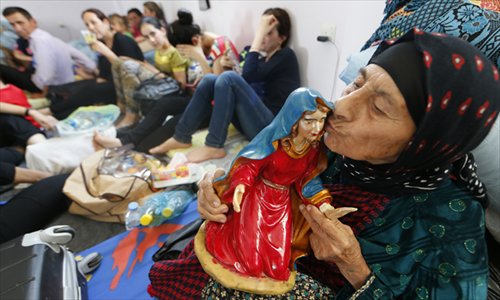HOME >> WORLD
Tikrit ablaze as army, ISIS clash
Source:Global Times-Agencies Published: 2014-6-28 0:18:02
Kurds claim self-rule after occupying Kirkuk

An Iraqi Christian woman fleeing violence kisses the head of a statue representing a Christian saint at a community center in the Kurdish city of Arbil in Iraq's autonomous Kurdistan region on Friday. Photo: AFP
Iraqi forces fought for a strategically located university campus outside Tikrit Friday and bombarded the city in an effort to retake it from Sunni Arab insurgents.Iraqi forces swooped into Tikrit University by helicopter on Thursday, and a police major said that there were periodic clashes between insurgents and security forces on the campus on Friday.
A senior army officer said that Iraqi forces were carrying out a major wave of air strikes against militants in Tikrit to protect the forces at the university and prepare for an assault on the city.
Iraqi troops are deployed in areas around the city for the assault, the officer said.
Another senior officer said taking the university is an important step in regaining control of Tikrit, the hometown of executed leader Saddam Hussein, which was seized by Sunni Arab militants on June 11.
In further fallout from the crisis, Iraqi Kurdish leader Massud Barzani said Baghdad could no longer object to Kurdish self-rule in the northern oil city of Kirkuk and other towns from which federal forces pulled out in the face of the insurgent advance.
"Now, this [issue] ... is achieved," he said, referring to a constitutional article meant to address the Kurds' decades-old ambition to incorporate the territory in their autonomous region over the objections of successive governments in Baghdad.
On Thursday, Iraqi Prime Minister Nouri al-Maliki, said in an interview with the BBC that the Syrian air force had carried out strikes against militants on the Syrian side of the Al-Qaim border crossing, which is controlled by the jihadist Islamic State in Iraq and Syria (ISIS).
ISIS also overran swathes of northeastern Syria, and is fighting both Syrian government forces and other rebels opposing Syrian President Bashar al-Assad.
Maliki said Baghdad had not requested the Syrian strikes, but he "welcomed" any such move against the ISIS-led militants.
The Obama administration on Thursday asked for $500 million from Congress to train and equip vetted members of Syria's opposition, the most significant move so far by the US to support those fighting against the regime in Damascus.
Pentagon spokesman Rear Admiral John Kirby said the funds would allow the US military to "train and equip appropriately vetted elements of the moderate Syrian armed opposition."
In an interview with the Global Times on Friday, Syrian Ambassador to China, Imad Moustapha, slammed Washington's move, saying it was ridiculous that US President Barack Obama divided "terrorists in Syria" into "good opposition" and "extreme opposition."
The envoy claimed that it was nothing new for the US to aid Syrian rebels, as the US, Europe and Saudi Arabia have been funding terrorists within the borders of Syria. "However, you cannot hold double standards in the fight against ISIS," he said.
In another part of the conflict, more than 1,200 Chinese workers, who had been stuck at a camp in Samarra, Salaheddin Province, for two weeks, were evacuated to Baghdad, reported China Central Television (CCTV).
The workers were building a power plant in Samarra, where Iraqi forces and insurgents are engaged in heavy fighting.
On Thursday, nearly 50 workers were airlifted to Baghdad, while the rest took buses to the capital. On Friday, all of them arrived in Baghdad, and were settled at hotels, reported CCTV.
A source from CMEC Friday told the Global Times on condition of anonymity that the evacuation was coordinated by the Chinese government and protected by Iraqi forces.
China has a sizeable business presence in Iraq since the US invasion in 2003.
China's foreign ministry puts the number of Chinese nationals in Iraq at more than 10,000.
Most of the Chinese nationals and projects are in Baghdad and southern Iraq, which are still controlled by the Iraqi government.
Up until now, there is no indication that the Chinese government has plans for a large-scale evacuation of nationals, but Chinese businesses are making individual contingency plan.
Posted in: Mid-East